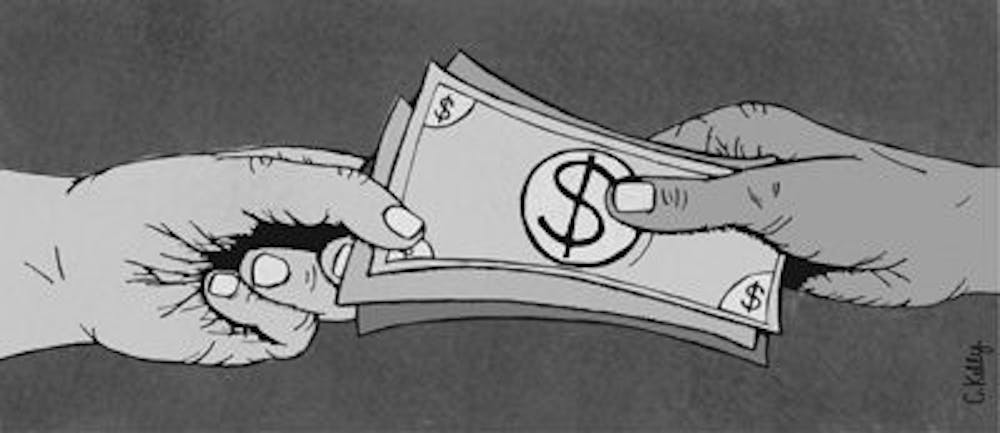Cat's view:
Yes, we are still living in a weak economy. Finding a remedy to our economic woes is paramount, but this doesn't mean we should support every solution proposed.
Raising the minimum wage is a quick-fix solution Americans would be smart to avoid. Sure, it sounds nice, but the reality is anything but nice.
Obviously, the money has to come from somewhere. The government may make the law, but they aren't giving any money to the people who actually pay out: business owners.
It's the business owners who will have no choice, but to increase their selling prices to stay within the law. This includes price increases for food, clothing, gas and anything else you frequently buy.
Say goodbye to the Dollar Menu.
Economists David Neumark, of UC-Irvine, and William Wascher, of the Federal Reserve Board, recently released a collective study showing 85 percent of research points to a loss of jobs following an increase in minimum wage.
Since the majority of the retail workforce is comprised of minimum wage employees, the already difficult task of finding a job for unskilled workers will become much worse. When businesses are forced to pay people more, they naturally hire fewer people.
So if you happen to be one of the lucky few with a job, you'll be explaining to infuriated customers why they can no longer afford their lunches.
Let's say we do raise the minimum wage. Will the poor really benefit? Unfortunately, the answer is no. According to the Census Bureau, approximately 60 percent of people living in poverty are unemployed and would not benefit from a raise.
We should also pay attention to the 28 states that have increased the minimum wage in the four years prior to the most recent federal minimum wage increase. Economists from Cornell and American Universities found no associated reduction in poverty rates in these states.
Another study, published in the Journal of Human Resources, found a higher minimum wage can actually increase the proportion of families living at or near the poverty.
This is the result of business owners being forced to make the tough choice of cutting staff or closing shop.
The real issue is inflation.
If we continue to ignore the corporate price gouging that's already making our hard earned cash disappear faster than ever before, the minimum wage will be the last thing to worry about.
__________________________________________________________
Raye's view:
The minimum wage was established in America in 1938 when President Roosevelt signed into law the post-Depression era Fair Labor Standards Act, placing the minimum wage at 25 cents per hour and establishing a maximum 44-hour work week.
The value of the minimum wage rose steadily to adjust for inflation, according to raisetheminimumwage.com, until it reached its high point in 1968 at $1.60 per hour, when Congress began failing to adjust for inflation.
At its inception, the minimum wage was meant to be a living wage, or the amount of money an earner could feasibly live on and stay above the poverty line.
A minimum wage employee earning $7.25 per hour working 40 hours per week will only earn $15,080 per year.
The poverty line rests just above that at $15,130.
Living at or below the poverty line isn't earning a living wage -- it's the definition of poverty.
We like to think those working at minimum wage jobs are teenagers and college students, but that simply isn't the reality.
Many people working these jobs have husbands, wives and children they're supporting. Many of them work two jobs just to make ends meet.
What can't you pay for earning a $15,130 yearly wage?
A house.
A decent car.
College.
You may be able to have one of those things, but with the cost of gas, groceries, electricity, water -- with a $500 per month rent payment, you're already out $6,000 -- nearly half of your yearly earnings -- and few apartments are cheap.
By raising the minimum wage, we give people a chance.
A chance to get out of government housing.
A chance to rise above welfare.
Without it? We keep the poor poor.
We make the wealth divide even greater and the climb to the top even steeper.
We take away the chances of those who are already given so little.
The current minimum wage is creating a ceiling for those who already have little.
It forces men and women into working, sometimes upwards of 80 hours per week -- and for what? Survival.
The minimum wage is not a living wage.
By refusing to raise it, we condemn the 3.6 million people earning $7.25 or less to a life of near poverty, poverty or worse.
Do you like this story? The Plainsman doesn't accept money from tuition or student fees, and we don't charge a subscription fee. But you can donate to support The Plainsman.





